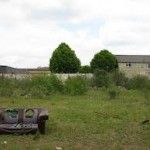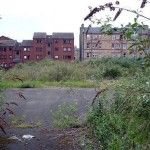The abandonment of exploited places following market changes and recession accelerates degeneration and reinforces place based deprivation. What can be done to address the imbalances in relationships between corporate power, political systems and local people that tend to corrupt the democratic processes for addressing such challenges?
This issue shows the importance of critically reflecting on Scotland’s past experiences and its present circumstances with respect to place based deprivation in order to consider future agendas around any possible constitutional change. How do we address the imbalances between corporate power, political systems and local people that inhibit addressing degeneration in a modern economy such as Scotland? Some deliberate steps are required.
First, we need to make an intellectual change and acknowledge the huge elephant in the room – we live and work in a capitalist market system in which private interests predominate and devalue any real sense of the wider public interest. This sets very specific parameters for us. Whilst the positive aspects of that economic and business led machine are lauded – the negative effects – the damage to our collective economic, social, psychological and environmental health – are ignored, disputed or marginalised. They do not assume centre stage in our polity – which defers to economic, property and financial interests. Debates about degeneration or regeneration are rarely contextualised appropriately and we fail to recognise the real causes of the problems of dereliction and place based deprivation
private interests predominate and devalue any real sense of the wider public interest. This sets very specific parameters for us. Whilst the positive aspects of that economic and business led machine are lauded – the negative effects – the damage to our collective economic, social, psychological and environmental health – are ignored, disputed or marginalised. They do not assume centre stage in our polity – which defers to economic, property and financial interests. Debates about degeneration or regeneration are rarely contextualised appropriately and we fail to recognise the real causes of the problems of dereliction and place based deprivation
Second, we need to be more honest with ourselves about recognising the huge division between private interests and property rights and the wider public interest. The lexicon of political and policy action is conventionally expressed in private terms – with emphases on growth, investment, profits and jobs. The downside cannot be expressed in such marketised metrics and therefore the costs of market failures appear nebulous in comparison. There is also the time, energy, generational costs imposed on communities in adapting to their damaged circumstances, and the costs of political obfuscation in critically addressing the associated issues. The focus always moves on – the “going forward” mantra.
Third, at a time of economic contraction and austerity and the prospects of a jobless recovery we need to be alert to the issues of waste which in the capitalist machine is very evident and material. It affects all facets of society – land, labour and capital – as elements of each are exploited and discarded in the myopic pursuit of profit and private gain. Here, discarded land, buildings and sites are part of this process. Scotland needs a full audit of the damage associated with discarded sites and localities. This would not be merely a physical record of distress but a dynamic analysis of the impacts on inter-related processes of local labour markets, educational provision and opportunities, provision of services, and environmental quality. In effect it would be a record of the true costs of tolerating exploitation and distress for so long. It should also embrace wider conditions of the land question – discarded sites are on a spectrum that includes shrinking land due to environmental stress and vulnerable land due to ownership and legal factors
labour and capital – as elements of each are exploited and discarded in the myopic pursuit of profit and private gain. Here, discarded land, buildings and sites are part of this process. Scotland needs a full audit of the damage associated with discarded sites and localities. This would not be merely a physical record of distress but a dynamic analysis of the impacts on inter-related processes of local labour markets, educational provision and opportunities, provision of services, and environmental quality. In effect it would be a record of the true costs of tolerating exploitation and distress for so long. It should also embrace wider conditions of the land question – discarded sites are on a spectrum that includes shrinking land due to environmental stress and vulnerable land due to ownership and legal factors
Fourth, Scotland needs a robust and assertive statement of intent about its intentions to deal with the land question at large and the specific issues of dereliction to ensure they do not recur. We have started this journey – witness the economic strategies, the National Planning Framework and the Land Use Strategy and the important dynamic is to link physical dereliction to wider social, economic and environmental processes. This needs appropriate arrangements to be put into place. Here Scotland must consider radical alternatives to deal with these pressing – to include the possibility of nationalisation or municipalisation of the derelict sites. This would allow for a positive and deliberate agenda to bring such places back into socially productive uses. This does not mean a naïve reversion to land and property development as the only recourse for such state led engagement – the sites could be converted into allotments, community gardens, mini-parks or landscaped areas to enhance the local public realm. It also does not mean a dirigiste framework but one in which communities can recover their local identity. This is as much about the re-democratisation of Scotland as the technocratic improvement of lost sites.
Strategy and the important dynamic is to link physical dereliction to wider social, economic and environmental processes. This needs appropriate arrangements to be put into place. Here Scotland must consider radical alternatives to deal with these pressing – to include the possibility of nationalisation or municipalisation of the derelict sites. This would allow for a positive and deliberate agenda to bring such places back into socially productive uses. This does not mean a naïve reversion to land and property development as the only recourse for such state led engagement – the sites could be converted into allotments, community gardens, mini-parks or landscaped areas to enhance the local public realm. It also does not mean a dirigiste framework but one in which communities can recover their local identity. This is as much about the re-democratisation of Scotland as the technocratic improvement of lost sites.
There needs to be a radical shift in our values at this time. Scotland needs to assert a sense of collective responsibility based on a new and democratic civic morality. We need a robust and informed conversation about how we use our resources – land, labour and capital. Just what sort of society do we want? It may not be about conventional growth but a state which pays attention to the quality of life and equity of opportunity. Derelict sites may be highly localised but they reflect badly on Scotland as a whole. The psychological damage perpetrated by an indifferent and wasteful capitalist system, a myopic state and an indifference to the collective interest is not good enough for a future Scotland. Significantly these steps are needed whether or not constitutional change takes place.
